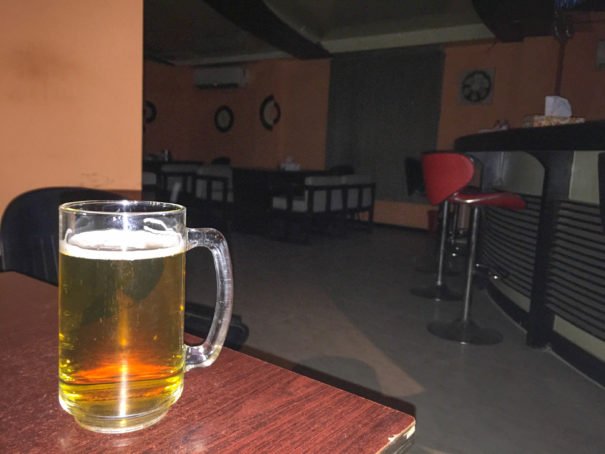
Potentially the World’s Least‑Fun Beach Beer

Potentially the World’s Least‑Fun Beach Beer
Heineken in Cox’s Bazar
Outside, the Indian Ocean was the temperature of bath water, lapping gently at the shore. The dull murmur of the waves was barely audible above the incessant horns of passing rickshaws and motorized three-wheelers scooting through Cox’s Bazar, a burgeoning tourist town in Bangladesh’s southeast corner. The beach runs unbroken for 75 miles, allegedly the longest in the world, and in the evening the sun dips gently into the Bay of Bengal.
But I was inside, at a hotel across the street, through the lobby and behind two unmarked doors in a dimly lit room reminiscent of my grandparents’ basement. Lounge chairs surrounded a few low-lying wooden tables, but I was alone. A single recessed lightbulb shone over one corner of a bar top, reflecting dully in the wine glasses and champagne flutes hung stem-up over the bar.
I came here to get a beer.
Bangladesh is a mostly Muslim country, and alcohol is more or less illegal nationwide. But hotels and clubs that serve foreigners can sometimes obtain special government licenses to sell liquor. In Cox’s Bazar, alcohol is relegated to a few dark corners such as this one, advertised mostly by word-of-mouth to tourists.
Once I found my way inside, the bartender looked me up and down before pouring a cold, six-dollar glass of Heineken. We sat in silence, the mechanical hum of the air conditioner providing the only soundtrack.
For now, Cox’s Bazar mostly attracts domestic tourists from elsewhere in Bangladesh. Locals say business is booming, and the scores of skeletal half-finished hotels under construction suggest that optimism for growth is high. Plans are underway to expand the local airport and bring in international flights. There’s no reason why Cox’s Bazar couldn’t compete with the world-renowned beaches in Thailand or Vietnam, locals claim.
But much of that expected growth is likely to come from foreigners, especially Europeans and Asians looking for a reasonably priced holiday without the crowds of bigger beach resorts. To attract them, local hoteliers acknowledge, the government will have to loosen its anti-liquor laws. Foreign tourists want to throw back a couple cold ones at a beach-side cafe or nightclub, they note, not sit in silence in an unmarked room deep in the bowels of their hotel.
In the meantime, Cox’s Bazar is better known for the hundreds of thousands of Rohingya refugees who live in poverty on its outskirts, in flimsy huts and collections of muddy camps. A Muslim minority group from neighboring Myanmar, the Rohingya have been forced out by Buddhist nationalists in their home country and struggle to build their life anew in Bangladesh. Many locals distrust the refugees, claiming that they are criminals who degrade their country’s reputation and smuggle meth across the border.
One overpriced beer in a dark hotel bar was enough for me. I downed it quickly, paid up and left, passing back into the glaring florescent lights of the lobby on my way out. The bartender locked the door behind me.
Julian Hattem’s reporting in Bangladesh is being supported by the International Reporting Project.